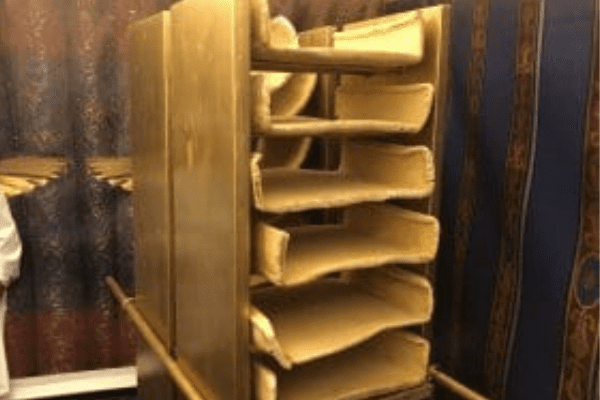
TORAH
NEVI'IM
KETUVIM
undefined - Chapter 24
Translation and Transliteration of undefined - Chapter 24
Listen to this chapter in Hebrew:
Audio Player- Commentary
- Buy E-book
- Buy the Israel Bible
1Hashem spoke to Moshe, saying:
אוַיְדַבֵּר יְהֹוָה אֶל־מֹשֶׁה לֵּאמֹר׃
2Command B'nei Yisrael to bring you clear oil of beaten olives for lighting, for kindling lamps regularly.
בצַו אֶת־בְּנֵי יִשְׂרָאֵל וְיִקְחוּ אֵלֶיךָ שֶׁמֶן זַיִת זָךְ כָּתִית לַמָּאוֹר לְהַעֲלֹת נֵר תָּמִיד׃
3Aharon shall set them up in the Tent of Meeting outside the curtain of the Pact [to burn] from evening to morning before Hashem regularly; it is a law for all time throughout the ages.
גמִחוּץ לְפָרֹכֶת הָעֵדֻת בְּאֹהֶל מוֹעֵד יַעֲרֹךְ אֹתוֹ אַהֲרֹן מֵעֶרֶב עַד־בֹּקֶר לִפְנֵי יְהֹוָה תָּמִיד חֻקַּת עוֹלָם לְדֹרֹתֵיכֶם׃
4He shall set up the lamps on the pure menorah before Hashem [to burn] regularly.
דעַל הַמְּנֹרָה הַטְּהֹרָה יַעֲרֹךְ אֶת־הַנֵּרוֹת לִפְנֵי יְהֹוָה תָּמִיד׃
5You shall take choice flour and bake of it twelve loaves, two-tenths of a measure for each loaf.
הוְלָקַחְתָּ סֹלֶת וְאָפִיתָ אֹתָהּ שְׁתֵּים עֶשְׂרֵה חַלּוֹת שְׁנֵי עֶשְׂרֹנִים יִהְיֶה הַחַלָּה הָאֶחָת׃
6Place them on the pure table before Hashem in two rows, six to a row.
ווְשַׂמְתָּ אוֹתָם שְׁתַּיִם מַעֲרָכוֹת שֵׁשׁ הַמַּעֲרָכֶת עַל הַשֻּׁלְחָן הַטָּהֹר לִפְנֵי יְהֹוָה׃
7With each row you shall place pure frankincense, which is to be a token offering for the bread, as an offering by fire to Hashem.
זוְנָתַתָּ עַל־הַמַּעֲרֶכֶת לְבֹנָה זַכָּה וְהָיְתָה לַלֶּחֶם לְאַזְכָּרָה אִשֶּׁה לַיהֹוָה׃
8He shall arrange them before Hashem regularly every Shabbat day—it is a commitment for all time on the part of the Israelites.
b'-YOM ha-sha-BAT b'-YOM ha-sha-BAT ya-ar-KHE-nu lif-NAY a-do-NAI ta-MEED may-AYT b'-nay yis-ra-AYL b'-REET o-LAM
חבְּיוֹם הַשַּׁבָּת בְּיוֹם הַשַּׁבָּת יַעַרְכֶנּוּ לִפְנֵי יְהֹוָה תָּמִיד מֵאֵת בְּנֵי־יִשְׂרָאֵל בְּרִית עוֹלָם׃
![]() 24:8 He shall arrange them before Hashem regularly
24:8 He shall arrange them before Hashem regularly
Just as Aharon arranges the candles of the Temple menorah (Numbers 8:2-3), he is to arrange the twelve loaves of bread every Shabbat as a “commitment for all time.” On the day that the Children of Israel desist from activities related to earning their livelihood and focus instead on their relationship with the Almighty, Aharon sets the bread before Hashem, reflecting the understanding that it is He who ultimately provides mankind with their physical sustenance. Both the menorah and the lechem hapanim (לחם הפנים) ‘bread of display,’ or ‘shewbread,’ are a constant presence in the Beit Hamikdash. The light of the lamp symbolizes the spiritual life of the people, while bread symbolizes the physical realm. When the People of Israel rest on the Shabbat and focus on matters of the soul, God ensures that their physical well-being will be taken care of as well.
9They shall belong to Aharon and his sons, who shall eat them in the sacred precinct; for they are his as most holy things from Hashem's offerings by fire, a due for all time.
טוְהָיְתָה לְאַהֲרֹן וּלְבָנָיו וַאֲכָלֻהוּ בְּמָקוֹם קָדֹשׁ כִּי קֹדֶשׁ קָדָשִׁים הוּא לוֹ מֵאִשֵּׁי יְהֹוָה חָק־עוֹלָם׃
10There came out among the Israelites one whose mother was Israelite and whose father was Egyptian. And a fight broke out in the camp between that half-Israelite and a certain Israelite.
יוַיֵּצֵא בֶּן־אִשָּׁה יִשְׂרְאֵלִית וְהוּא בֶּן־אִישׁ מִצְרִי בְּתוֹךְ בְּנֵי יִשְׂרָאֵל וַיִּנָּצוּ בַּמַּחֲנֶה בֶּן הַיִּשְׂרְאֵלִית וְאִישׁ הַיִּשְׂרְאֵלִי׃
11The son of the Israelite woman pronounced the Name in blasphemy, and he was brought to Moshe—now his mother's name was Shelomith daughter of Dibri of the tribe of Dan—
יאוַיִּקֹּב בֶּן־הָאִשָּׁה הַיִּשְׂרְאֵלִית אֶת־הַשֵּׁם וַיְקַלֵּל וַיָּבִיאוּ אֹתוֹ אֶל־מֹשֶׁה וְשֵׁם אִמּוֹ שְׁלֹמִית בַּת־דִּבְרִי לְמַטֵּה־דָן׃
12and he was placed in custody, until the decision of Hashem should be made clear to them.
יבוַיַּנִּיחֻהוּ בַּמִּשְׁמָר לִפְרֹשׁ לָהֶם עַל־פִּי יְהֹוָה׃
13And Hashem spoke to Moshe, saying:
יגוַיְדַבֵּר יְהֹוָה אֶל־מֹשֶׁה לֵּאמֹר׃
14Take the blasphemer outside the camp; and let all who were within hearing lay their hands upon his head, and let the whole community stone him.
ידהוֹצֵא אֶת־הַמְקַלֵּל אֶל־מִחוּץ לַמַּחֲנֶה וְסָמְכוּ כָל־הַשֹּׁמְעִים אֶת־יְדֵיהֶם עַל־רֹאשׁוֹ וְרָגְמוּ אֹתוֹ כָּל־הָעֵדָה׃
15And to B'nei Yisrael speak thus: Anyone who blasphemes his God shall bear his guilt;
טווְאֶל־בְּנֵי יִשְׂרָאֵל תְּדַבֵּר לֵאמֹר אִישׁ אִישׁ כִּי־יְקַלֵּל אֱלֹהָיו וְנָשָׂא חֶטְאוֹ׃
16if he also pronounces the name Hashem, he shall be put to death. The whole community shall stone him; stranger or citizen, if he has thus pronounced the Name, he shall be put to death.
טזוְנֹקֵב שֵׁם־יְהֹוָה מוֹת יוּמָת רָגוֹם יִרְגְּמוּ־בוֹ כָּל־הָעֵדָה כַּגֵּר כָּאֶזְרָח בְּנָקְבוֹ־שֵׁם יוּמָת׃
17If anyone kills any human being, he shall be put to death.
יזוְאִישׁ כִּי יַכֶּה כָּל־נֶפֶשׁ אָדָם מוֹת יוּמָת׃
18One who kills a beast shall make restitution for it: life for life.
יחוּמַכֵּה נֶפֶשׁ־בְּהֵמָה יְשַׁלְּמֶנָּה נֶפֶשׁ תַּחַת נָפֶשׁ׃
19If anyone maims his fellow, as he has done so shall it be done to him:
יטוְאִישׁ כִּי־יִתֵּן מוּם בַּעֲמִיתוֹ כַּאֲשֶׁר עָשָׂה כֵּן יֵעָשֶׂה לּוֹ׃
20fracture for fracture, eye for eye, tooth for tooth. The injury he inflicted on another shall be inflicted on him.
כשֶׁבֶר תַּחַת שֶׁבֶר עַיִן תַּחַת עַיִן שֵׁן תַּחַת שֵׁן כַּאֲשֶׁר יִתֵּן מוּם בָּאָדָם כֵּן יִנָּתֶן בּוֹ׃
21One who kills a beast shall make restitution for it; but one who kills a human being shall be put to death.
כאוּמַכֵּה בְהֵמָה יְשַׁלְּמֶנָּה וּמַכֵּה אָדָם יוּמָת׃
22You shall have one standard for stranger and citizen alike: for I Hashem am your God.
כבמִשְׁפַּט אֶחָד יִהְיֶה לָכֶם כַּגֵּר כָּאֶזְרָח יִהְיֶה כִּי אֲנִי יְהֹוָה אֱלֹהֵיכֶם׃
23Moshe spoke thus to the Israelites. And they took the blasphemer outside the camp and pelted him with stones. The Israelites did as Hashem had commanded Moshe.
כגוַיְדַבֵּר מֹשֶׁה אֶל־בְּנֵי יִשְׂרָאֵל וַיּוֹצִיאוּ אֶת־הַמְקַלֵּל אֶל־מִחוּץ לַמַּחֲנֶה וַיִּרְגְּמוּ אֹתוֹ אָבֶן וּבְנֵי־יִשְׂרָאֵל עָשׂוּ כַּאֲשֶׁר צִוָּה יְהֹוָה אֶת־מֹשֶׁה׃








